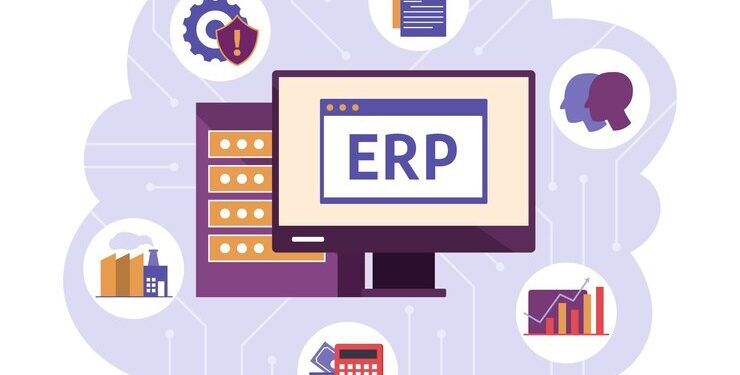Enterprise Resource Planning (ERP) systems have become essential tools for modern businesses, offering a unified approach to manage and streamline various business functions. In this blog post, we’ll explore the key aspects of ERP systems, how they operate, the relevance of ERP systems in UAE, and provide examples to showcase their real-world applications. Whether you’re considering implementing an ERP system in your organization or looking to optimize your current one, this guide will cover everything you need to know.
What is an ERP System?
An ERP system is a software solution designed to integrate various business processes, such as accounting, human resources, supply chain management, inventory, procurement, and customer relationship management, into one unified system. By doing so, it enables organizations to collect, store, and analyze data from multiple departments in a central database, fostering more effective decision-making.
Key Features of ERP Systems:
- Centralized Data Management: All departments within the organization have access to the same data, which reduces data redundancy and improves collaboration.
- Automation: ERP systems automate repetitive tasks, such as order processing and payroll, reducing human error and improving efficiency.
- Real-Time Reporting: ERP systems provide real-time insights, allowing for quicker and more informed decision-making.
- Scalability: As businesses grow, ERP systems can be scaled to accommodate additional users, modules, and functions.
- Customization: ERP software can be tailored to meet the unique needs of your business, ensuring a better fit for your company’s requirements.
ERP System in UAE: Why It’s Gaining Popularity
The UAE is rapidly becoming a hub for technological advancement and business innovation in the Middle East. As companies in the UAE strive to stay competitive and streamline their operations, the adoption of ERP systems in UAE has become a key trend.
Benefits of ERP Systems in UAE:
- Compliance with Local Regulations: ERP systems help businesses in the UAE stay compliant with the country’s tax regulations and labor laws. The ability to track and manage financial data in real-time ensures that businesses adhere to the strict requirements set by local authorities.
- Efficient Resource Management: Businesses in the UAE, especially those in sectors like construction, hospitality, and retail, benefit from ERP systems by managing resources effectively. This leads to improved production cycles, cost management, and service delivery.
- Enhanced Customer Experience: With centralized data, businesses can provide better customer service by having access to detailed customer information, preferences, and purchase history.
- Integration with UAE’s Digital Economy: ERP systems in the UAE support integration with government services and various digital platforms, helping businesses to interact seamlessly with the government and other stakeholders.
Challenges of Implementing ERP Systems in UAE:
While ERP systems offer several advantages, businesses in the UAE may face challenges such as the high initial implementation cost, the complexity of customization, and the need for skilled professionals to manage the system. However, the long-term benefits outweigh these challenges, making ERP systems a wise investment for many businesses in the region.
ERP System Examples: Real-World Applications
To better understand how ERP systems work in practice, let’s look at some ERP system examples from various industries.
1. Manufacturing Industry
In the manufacturing sector, ERP systems are used to streamline production processes, manage inventory, and ensure timely delivery of products. By integrating data from the production line, suppliers, and logistics, manufacturers can optimize workflows and reduce operational costs. ERP systems also help in predictive maintenance, ensuring that machines are well-maintained and minimizing downtime.
2. Retail Industry
Retail businesses use ERP systems to manage inventory levels, track sales data, and integrate with e-commerce platforms. With an ERP system, retailers can provide real-time updates on stock availability, process online orders seamlessly, and gain insights into customer buying patterns. This enables them to make informed decisions regarding inventory restocking, promotional offers, and pricing strategies.
3. Healthcare Industry
Healthcare organizations leverage ERP systems to manage patient records, inventory (e.g., medicines and medical equipment), and staff schedules. By integrating various functions, ERP systems enable healthcare providers to deliver better patient care while ensuring operational efficiency and compliance with healthcare regulations.
4. Hospitality Industry
Hotels and restaurants use ERP systems to streamline their operations, manage bookings, process payments, and track customer preferences. With real-time data on room availability, customer requests, and financial transactions, hospitality businesses can improve guest experiences and increase profitability.
5. Construction Industry
Construction companies use ERP systems to manage project timelines, budgets, workforce, and materials. The system integrates data from different departments, such as project management, procurement, and HR, ensuring smooth project execution and reducing the risk of delays and cost overruns.
How to Choose the Right ERP System for Your Business?
Choosing the right ERP system depends on various factors such as your business size, industry requirements, and specific operational challenges. Here are some tips for selecting the right ERP system for your organization:
1. Assess Your Business Needs
Before choosing an ERP system, it’s crucial to assess your business needs. Identify which departments and functions need improvement, whether it’s finance, inventory management, or HR. This will help you choose a system with the right modules and capabilities.
2. Scalability and Flexibility
Ensure that the ERP system can scale with your business growth. Choose a solution that can adapt to future needs, whether that’s adding more users, integrating with new tools, or expanding into new markets.
3. User-Friendly Interface
The ERP system should have an intuitive and user-friendly interface. Since multiple teams will be using the system, it’s essential that employees can easily navigate the software without extensive training.
4. Customization Options
Different industries have unique requirements, so the ERP system should be customizable to fit your specific needs. Look for a solution that allows you to tailor workflows, reports, and user access based on your business processes.
5. Cloud vs. On-Premise
ERP systems come in both cloud-based and on-premise options. Cloud-based ERP systems are generally more cost-effective, offer remote access, and require less IT maintenance. On-premise systems offer more control and security but often come with higher upfront costs and maintenance.
Conclusion
In conclusion, ERP systems have become an indispensable tool for businesses in various industries, providing automation, data integration, and streamlined operations. The growing popularity of ERP systems in UAE is a testament to their effectiveness in improving business processes and helping organizations remain competitive in the global market. By examining ERP system examples across different sectors, it’s clear that these systems offer immense value across a wide range of business functions.
Implementing an ERP system can be a game-changer for your business. It improves efficiency, ensures compliance, and enhances decision-making capabilities, helping your organization stay ahead of the competition. However, the success of an ERP system depends on careful selection, customization, and ongoing support. Take the time to evaluate your needs, choose the right solution, and ensure that your team is well-prepared to leverage the power of an ERP system.
FAQs
1. What is an ERP system?
An ERP (Enterprise Resource Planning) system is a software solution that integrates and automates key business functions like finance, HR, inventory, and procurement into one unified platform.
2. Why are ERP systems important for businesses?
ERP systems are important because they streamline business processes, reduce manual errors, improve efficiency, and provide real-time insights for better decision-making.
3. How does an ERP system work in the UAE?
In the UAE, ERP systems help businesses comply with local tax laws, streamline HR functions, manage supply chains, and improve operational efficiency, all while adapting to the region’s specific business regulations.
4. Can ERP systems be customized for different industries?
Yes, ERP systems are highly customizable. They can be tailored to meet the unique needs of industries like manufacturing, retail, healthcare, hospitality, and construction.
5. What are some examples of ERP systems?
Popular ERP systems include SAP, Oracle ERP, Microsoft Dynamics 365, and NetSuite. These systems are used by businesses worldwide to manage operations across various departments.








![[https://ssstik.kim]-tiktok-downloader](https://hufpostt.com/wp-content/uploads/2025/04/Screenshot_13-360x180.png)
























